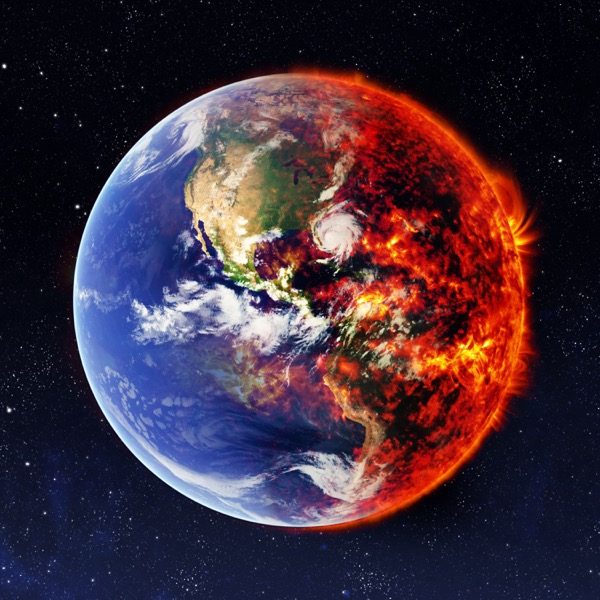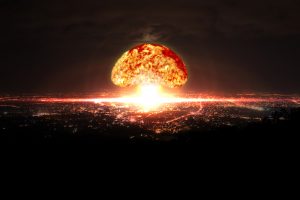Russia-Ukraine War: The Horrifying Science of What Would Happen if Nuclear War Broke Out

Musa Sattar, UK
The Ukraine-Russia conflict, sanctions, and the fear of war have shaken everyone. The emerging images and disturbing videos showcasing the events on social media about Russia’s invasion of Ukraine have sparked conversations about a looming global war. Headlines following the Russia-Ukraine War have initiated Cold War anxieties and the possible use of nuclear weapons, despite Russia, the United States, and the UK agreeing to nuclear peace by signing the Nuclear Non-Proliferation Treaty (NPT). Clear nuclear threats have been made by Vladimir Putin against any state that attempts to stop his country’s military domination of Ukraine. According to the International Atomic Energy Agency (IAEA), Ukraine has reported that ‘unidentified armed forces’ had taken control of facilities of Nuclear Power Plant.
If Russia is forced to use its nuclear arsenal in Ukraine, it will involve other nuclear powers to follow suit and thus a global nuclear conflict can ensue. The subsequent ripple effects will be felt by the rest of the planet. As a world in crisis stands at the brink of World War III, are we ready to face the ramifications of a nuclear war?
In this article, I will outline the calamitous effects of nuclear war supported by scientific evidence.
Nuclear Conflict Would Compromise Global Food Security
In the likely event of a nuclear conflict, national trade restrictions will come into play to stabilise national markets and widespread spikes in prices will have an effect on international market instability. This could aggravate food shortages in communities with fewer resources and potentially trigger additional hunger and other adverse human health implications around the world.
Russia’s attack on Ukraine is already impacting the global food supply chains. There is a potential for a complete collapse in trade volumes, with all major exporters imposing bans on food exports. This would have severe implications for national food availability and thus food security.
A research paper published in the Proceedings of the National Academy of Sciences Of the United States of America (PNAS) states, ‘Even a limited nuclear war could substantially impair staple crop production with 20 to 50% losses, or 11% globally, on average for 5 years after the conflict.’
According to Nature, researchers predicted that a war involving less than 1% of the world’s nuclear arsenal could shatter the planet’s food supplies far worse than any in documented history.
Impacts of Nuclear Conflict on Ocean Acidification
Fossil fuel emissions of carbon dioxide (CO2) have already shifted the chemical balance of seawater to a more acidic state with lower pH levels; hence, ocean acidification is an ongoing, large-scale environmental problem. This acidification impacts the marine ecosystems and the food web by altering the cycling of oceanic nutrients, various elements, and compounds.
According to researchers at the Department of Atmospheric and Oceanic Sciences, University of Colorado, ‘Even a regional nuclear conflict can have an impact on global ocean acidification, adding to the list of the many, far-reaching consequences of nuclear conflict for a global society.’
Global Atmospheric and Climatic Consequences of Nuclear War
In addition to the destruction of shelter, food shortages, lack of transportation and communication, and radioactive contamination, sadly the survivors of nuclear war will also have to face challenging climate change effects.
A combined new research carried out by the National Center for Atmospheric Research and other institutions published in Journal of Geophysical Research indicates that smoke columns generated by nuclear war would drastically change the world’s climate for years to come, as they would destroy the ozone layer with a global loss of almost 75%, thereby threatening human health.
Researchers from NASA Ames Research Center, Cornell University, and planetary scientist Carl Sagan explained that when combined with the prompt destruction from nuclear blasts, smoke from incinerated cities would block sunlight and plunge much of the planet into a deep freeze lasting for months, even in summer, posing a serious threat to human survivors and to other species.
Radioactive Fallout – The Future of Our Children and the Fate of the Next Generations
According to The Bulletin of the Atomic Scientists, ‘The pain and suffering caused by those bombings [Hiroshima, Nagasaki] are almost beyond human comprehension… [they] should stand as an eternal reminder of the need to prevent nuclear weapons from ever being used in anger again.’
The destruction of civilization that would follow a nuclear war would render any disaster ever recorded insignificant. The complex interactive effects of stress, malnutrition, and an immune system damaged by radiation would weaken the physiological defences to a point where people may succumb to diseases presently considered to be only moderately virulent.
Studies of the horrific events of the Hiroshima and Nagasaki bombings revealed an increased propensity for children to be diagnosed with leukemia and other cancers years after the bombings. It also amplified perinatal deaths and cases of microcephaly and retardation in children exposed in utero to the bombs were also revealed. A wide-scale nuclear conflict will afflict coming generations to cancer, developmental problems, disease, and death.
In the event that there are future generations after a nuclear war, the issue of heritable genetic effects will become important, according to research published by American Medical Association. Dr Michael S. Kappy, in Effects of Nuclear War in Children, suggests that the genetic effects of modern weaponry will be incalculable as compared to the Hiroshima and Nagasaki studies.
Recognising the Creator: The Essential Remedy
Given the horrifying consequences of a nuclear conflict, while it is difficult to imagine how to cope, the primary focus must be on understanding and preventing the root cause of such an event. Our choices and decisions today will strongly shape which trajectory humanity will follow. As His Holiness, Hazrat Mirza Masroor Ahmad (aba), Head of the Worldwide Ahmadiyya Muslim Community said at the 13th annual Peace Symposium:
‘I believe that we still have the time to stop such a war in its tracks but the solution remains, as I have already said, to act with justice and to leave aside all vested interests… it is my belief that unless the world comes to recognise its Creator and accepts Him as the Sustainer of mankind, true justice cannot prevail.’
About the Author: Musa Sattar has an MSc in Pharmaceutical Analysis from Kingston University and also serves as the Assistant Manager of The Review of Religions and the Deputy Editor of the Science & Religion section.




Masha Allah
Jazakumullah Mukarram sahib